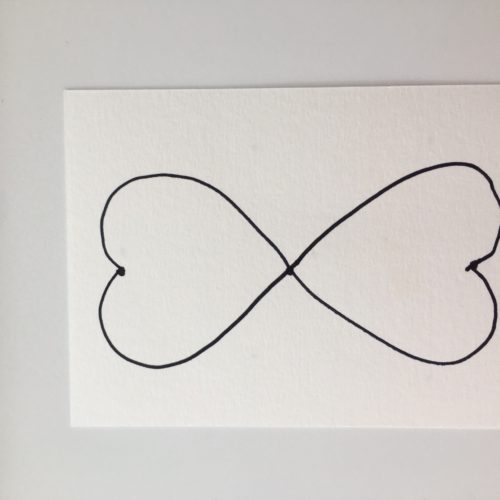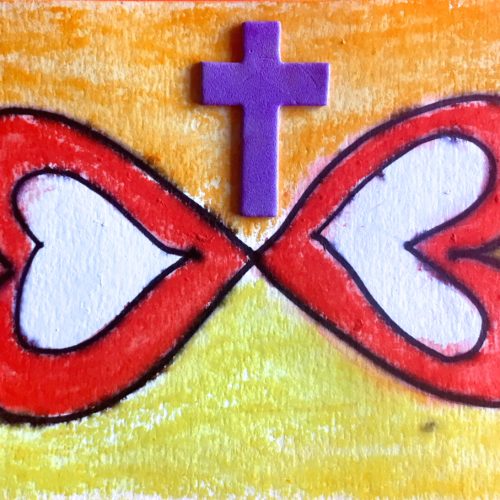“Jesus’ teaching about loving God, others, and ourselves is called the Great Commandment. When we follow the Great Commandment, we follow all of God’s Commandments. We live as God’s Children.”
Source: Believe Celebrate Live Reconciliation Sadlier Sacrament Program Page 13
For Parents to Teach to their Children
The Great Commandment is also known as “The Double Love Commandment:” “Jesus told his disciples and others: ‘Hear, O Israel! The Lord our God is Lord alone. You shall love the Lord your God with all your heart, with all your soul, with all your mind and with all your strength.’ The second is this: ‘You shall love your neighbor as yourself.’ There is no other commandment greater than these.” Source: USCCB .org Matthew, chapter 12:29-31

Note to Parents
There are many variations of the Ten Commandments. The ones below are from four excellent sources for children. Please read them and decide which is best for your child at their current age level. The last one is excellent for primary grades higher than third and up. Soon they will be reading from a “grown-up” Bible and they will learn the traditional version of the Ten Commandments. For children in grades one through third, I especially like versions two and three. They are relevant to a child’s life today, and use simple, modern language. Our art project poster is intended to give the children a “shorthand” method for learning the principles of the Ten Commandments.
The Ten Commandments–Traditional Version
Source: The New Saint Joseph First Communion Catechism Page 65
- “I am the Lord thy God; Thou shalt not have strange Gods before me.”
- Thou shalt not take the name of the Lord thy God in vain.
- Remember thou keep holy the Lord’s day.
- Honor thy father and thy mother.
- Thou shalt not kill.
- Thou shalt not commit adultery.
- Thou shalt not steal.
- Thou shalt not bear false witness against thy neighbor.
- Thou shalt not covet thy neighbor’s wife.
- Thou shalt not covet thy neighbor’s goods.”
The Ten Commandments– For Early Primary Students #1
From: A Child’s Guide to Reconciliation Page 6
By Elizabeth Ficocelli, Illustrated By Anne Catherine Blake
- “Love God with all your heart.
- Use God’s name with respect and love.
- Keep Sundays special and holy.
- Love and obey your mother and father.
- Treat God’s creations kindly.
- Respect your body as a gift from God.
- Don’t take things that don’t belong to you.
- Always tell the truth.
- Don’t be jealous or greedy.
- Help others who are in need.”
The Ten Commandments–For Early Primary Students #2
Source: God’s Gift Reconciliation Page 62
“I Follow God’s Laws”
- “Love nothing more than God.
- Use God’s name with reverence.
- Keep Sunday a day of prayer and rest.
- Respect those who care for you.
- Treat all human life with respect.
- Respect married life.
- Keep only what belongs to you.
- Tell the truth. Do not spread gossip.
- Respect your neighbors and friends.
- Be grateful when your needs are met.”
The Ten Commandments–For Older Primary Students
Source: Believe Celebrate Live Reconciliation Pages 12-13
- “We believe that there is only one God.
- We speak God’s name only with reverence, or honor and respect. He honor and respect the names of Jesus, Mary and all the saints.
- We join our parish each week for Mass on Sunday, The Lord’s Day, which begins on Saturday evening. We take time to rest and enjoy our
- and friends on the Lord’s Day.
- We listen to and obey our parents and all those who care forO.
- We respect all human life. We do not fight or hurt anyone.
- We respect our bodies and the bodies of others.
- We take care of what we have. We do not steal what other people have.
- We tell the truth. We do not gossip or tell lies about others.
- We show that we are thankful for our own family and friends. We are pure of heart and show love in an honest and faithful way.
- We show that we are thankful for what we have. We are not jealous of what others have.”
A Family Conversation–Why Do We Need the Ten Commandments?
As you prepare your children for First Reconciliation, there are many concepts to discuss. The Ten Commandments are God’s laws for us. They give us rules to follow to have a good relationship with God; and there are rules to follow to help us function as a family and a society. The Commandments cover all the bases for living a good life and avoiding evil. I remember listening to a “Book on Tape” in my car a number of years ago on the “History of God.” There was a panel of scholars and theologians from different faiths and the Ten Commandments was being discussed. One historian said that the Ten Commandments were recited in perhaps a “one-word” format, counted on fingers, by early, pre-literate people: “No Kill!” “No Steal!” etc.
I like the idea of helping young children think about the rules in this “handy” fashion, counting the rules on their finger tips. For the children in second and third grade preparing for First Reconciliation, it makes sense that they learn a version of the Commandments that means something to them. I remember struggling with using the word “adultery” with young children. But, there it was, written clearly on a banner on the wall of the School’s second grade classroom’s list of The Ten Commandments. Not only that, but the text we were using used the traditional wording, as well. I decided to use the word “adultery” as intended, in my discussion, explaining the commandment as “Honoring marriage vows.” We then focused on the meaning of vows and promises and the Sacrament of Marriage. No eyes rolled with boredom. Thankfully, the short and age-appropriate version was something the children could grasp.
As the discussions continue, please talk about “free will,” “right from wrong,” “moral choice,” “grace,” and “conscience.”
Definitions from Believe Celebrate Live Reconciliation Sadlier Sacrament Program
Free will--“God gives us the gift of free will. This gift allows us to make our own choices.”
Moral choice–“Before making a choice, we should stop and ask ourselves:”
-
- “If I do this, will I show love for God, others, and myself?”
Page 15
-
- “What would Jesus want me to do?”
Page 15
-
- “How do God’s laws help me to decide what to do?”
Page 14
Grace— “God gives us the help we need, the gift of grace, to do what he commands.”
Grace is also: “God’s life in us.” Source: God’s Gift Reconciliation Page 2
Conscience--“God has given us a gift to help us make the right choices. God has given us a consciences. Our conscience helps us to know what is right and what is wrong, what to do and what not to do. Our conscience helps us to obey God’s law.” Page 15
We were given a conscience by God that provides us with a “Moral Compass” to help us make moral choices. We use the laws given to us by God, the Father, by Jesus, God the Son, and with the help of God, the Holy Spirit to stay on the right path. We call on the Holy Spirit, to give us strength to make the right choices, and help us love others.
Materials for “Double Love” Infinity-Art Project
I started with a large sheet of watercolor paper cut into fourths. The smaller sheets are easier for the children to complete quickly. Make three dots down the center of the paper with a black Sharpie. Then draw a “figure 8,” serpentine, or “s-type” shape using the dots as a guide. Repeat by flipping the paper and drawing a second “s” to make a heart shape. If you can, try to make the black outline in one continuous movement. Now repeat with Sharpie inside the shape to create an outline. Fill in the outline with the water soluble pastels. Dip finger in water and trace all the drawing to liquify all the colors. They become watercolors. The paper curls a bit at first, but dries flat. Add a cross sticker, or draw one it, if desired.
Click on individual images to enlarge.
Suggestions for Homework
Please read “Jesus Calls His Disciples” in The Catholic Book of Bible Stories, pages 116-118. (Luke 5:1-11) (or in your own Catholic Children’s Bible, or directly from your family Bible.) Also, read page 119, “Faith to Grow” and “Prayer” as we begin our learning about Jesus, his disciples, and his teachings.
Read “Growing in Faith Together” on pages 19-23 of Believe Celebrate Live Reconciliation. (If you do not have the text, you can still do these activities.)
“At Mass this week, have the family members bless themselves with holy water and be reminded of their Baptism.” Page 18
“Hold your child’s hands and pray together the Lord’s Prayer. At the end of the prayer, encourage your child to forgive, in his or her heart, anyone who needs forgiveness, and do the same yourself. Emphasize the statement “Forgive us our trespasses as we forgive those who trespass against us.” Talk about why it is hard to forgive sometimes.” Page 20
“God makes our hearts new again in the sacraments. The sacraments are special signs given to us by Jesus through which we share in God’s life and love.” Page 23
Writing/Art Assignment:
“Complete this sentence: God’s love is like…” Page 23
Have your child make a pretty picture for the written paragraph with hearts and other symbols of God’s creation. Provide simple construction paper, stickers, markers, and a Sharpie pen.








